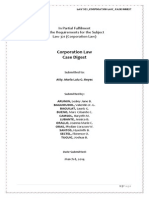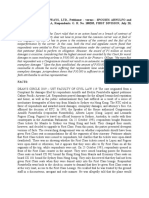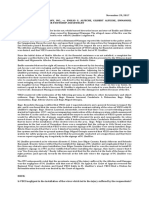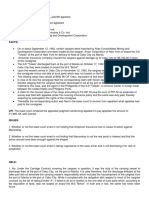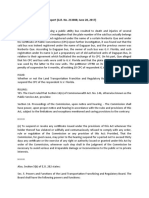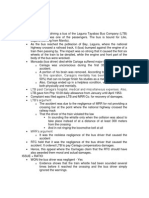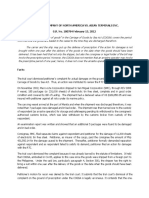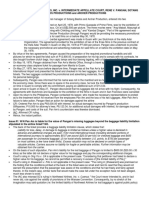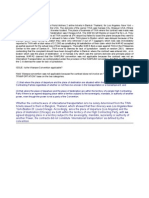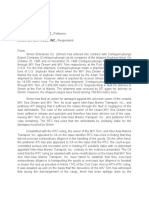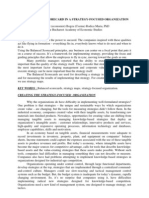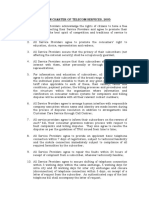Cathay vs. Sps. Fuentebella Digest
Cathay vs. Sps. Fuentebella Digest
Uploaded by
Stephanie Reyes GoCopyright:
Available Formats
Cathay vs. Sps. Fuentebella Digest
Cathay vs. Sps. Fuentebella Digest
Uploaded by
Stephanie Reyes GoOriginal Description:
Copyright
Available Formats
Share this document
Did you find this document useful?
Is this content inappropriate?
Copyright:
Available Formats
Cathay vs. Sps. Fuentebella Digest
Cathay vs. Sps. Fuentebella Digest
Uploaded by
Stephanie Reyes GoCopyright:
Available Formats
CATHAY PACIFIC VS. SPS.
FUENTEBELLA
Facts:
Congressmen Fuentebella and his wife was authorized to travel on an official business to
Sydney, Australia via Hong Kong from Manila. Respondents bought a business class ticket from
Cathay Pacific for Manila to Sydney via Hong Kong and back. They later changed their minds and
decided to upgrade to first class. Upon payment of the fare difference, the airline issued to the
respondent the first class tickets buy clarified they were open-dated or waitlisted.
When respondent queued in front of the first class counter in the airport, they were issued
business class boarding passes and only found out that they were not first class when denined
entry into the first class lounge. The respondents said the ground staff were discourteous,
arrogant and rude.
Petitioner admitted the first class tickets were issued but qualified as open-dated and in this
case they would not be accommodated to first class since the sections were full.
The spouses flew nonetheless but experienced discomfort, and when they returned to the
Philippines, respondet demanded a formal apology and payment for damages.
RTC identified the ticket as contract of adhesion as the contract was only entered because of the
assurance that they would be give first class seats and affording respondents testimonies, they
ordered petitioner to pay P5 million as moral damages, P1 million as exemplary damages, and
P500k as attorneys fees. And found the airline to be in bad faith.
The CA affirmed the RTCs decision that there was indeed bad faith on the airlines inferred from
the inattentiveness and lack of concern shown by petitioners personnel to the predicament of
the respondent and the fact that respondents were downgraded, from first to business class,
due to the overbooking.
ISSUE: W/N The CA erred in its decision in finding petitioners bad faith.
HELD: No.
RATIO:
Generally, moral and exemplary damages are not awarded in breach of contract cases, except
on two cases one, when the breach is wanton and deliberately injurious, or two, when the one
responsible had acted fraudulently or with malice or bad faith
Bad faith is a question of fact that must be proven by clear and convincing evidence
In this case, the SC agreed in both the RTCs and CAs decision that petitioner was indeed in bad
faith.
Petitioner argument that the testimonial evidence of the treatment accorded by its employees
to respondents is self-serving and, hence, should not have been the basis for the finding of bad
faith is wrong. The Rules of Court do not require that the testimony of the injured party be
corroborated by independent evidence. In fact, in criminal cases in which the standard of proof
is higher, the SC has ruled that the testimony of even one witness may suffice to support a
conviction. And in the present case, in which petitioner has had adequate opportunity to
controvert the testimonies of respondents.
Also, "the mere fact that respondent was a Congressman should not result in an automatic
increase in the moral and exemplary damages."
However, the award of P5 million as moral damages is excessive, considering the highest
amount ever awarded to moral damages cases involving airlines if P500k.
Wherefore, the SC affirmed the decision of the CA but reduced the amount of the moral
damages to P500k.
You might also like
- Manay V Cebu AirDocument2 pagesManay V Cebu AirRobert Rosales86% (7)
- Corporation Law Case DigestDocument488 pagesCorporation Law Case DigestKaizer Dave91% (44)
- FPSC Past Papers by TanveerDocument42 pagesFPSC Past Papers by TanveerMuhammad TanveerNo ratings yet
- CATHAY PACIFIC AIRWAYS V SPS. FUENTEBELLADocument2 pagesCATHAY PACIFIC AIRWAYS V SPS. FUENTEBELLAEm Alayza100% (2)
- G.R. No. L-3678 - Mendoza v. Philippine Air Lines, IncDocument4 pagesG.R. No. L-3678 - Mendoza v. Philippine Air Lines, IncMegan AglauaNo ratings yet
- Corporation LawDocument179 pagesCorporation LawGabe RuaroNo ratings yet
- Chapter 3 ExaminationDocument4 pagesChapter 3 ExaminationSurameto HariyadiNo ratings yet
- Transpo DigestDocument14 pagesTranspo DigestMara Corteza San PedroNo ratings yet
- Baño Vs Bachelor ExpressDocument2 pagesBaño Vs Bachelor ExpressMariz D.R.No ratings yet
- 049 Pan American World Airways vs. IACDocument2 pages049 Pan American World Airways vs. IACthornapple2567% (3)
- Mapa Vs CA DigestDocument3 pagesMapa Vs CA DigestJackie Dela CruzNo ratings yet
- Bano Vs Bachelor Express G.R. No. 191703 March 12, 2012 Perlas-Bernabe, J. FactsDocument1 pageBano Vs Bachelor Express G.R. No. 191703 March 12, 2012 Perlas-Bernabe, J. FactsMarco CervantesNo ratings yet
- American Airlines v. CA (Transpo)Document3 pagesAmerican Airlines v. CA (Transpo)Justine Camille RiveraNo ratings yet
- LLEDO - Designer Baskets Inc. v. Airsea TransportDocument3 pagesLLEDO - Designer Baskets Inc. v. Airsea TransportJames Ibrahim Alih100% (1)
- MAPA V. CA G.R. No. 122308 July 8 1997Document1 pageMAPA V. CA G.R. No. 122308 July 8 1997Jonil CaninoNo ratings yet
- Visayan Electric vs. Alfeche (847 SCRA 209)Document2 pagesVisayan Electric vs. Alfeche (847 SCRA 209)Gabriel HernandezNo ratings yet
- A. Magsaysay Inc. vs. Anastacio AganDocument2 pagesA. Magsaysay Inc. vs. Anastacio AganAmado EspejoNo ratings yet
- American Insurance V Macondray DigestDocument2 pagesAmerican Insurance V Macondray DigestRay KriegNo ratings yet
- The Government of The Philippine Islands Vs .Philippine SteamshipDocument1 pageThe Government of The Philippine Islands Vs .Philippine SteamshipKevin AmanteNo ratings yet
- SanPablo V Pantranco - DIGESTEDDocument2 pagesSanPablo V Pantranco - DIGESTEDHorizonzNo ratings yet
- Reyma Brokerage vs. Phil. Home AssuranceDocument2 pagesReyma Brokerage vs. Phil. Home AssuranceRhea Calabines0% (1)
- PNR V CADocument2 pagesPNR V CAKatrina Ysobelle Aspi HernandezNo ratings yet
- CD - 69. Marito Bernaces vs. Northwest Airlines - G.R No. 182395Document2 pagesCD - 69. Marito Bernaces vs. Northwest Airlines - G.R No. 182395Myka100% (1)
- Ramos Vs China Southern AirlinesDocument2 pagesRamos Vs China Southern AirlinesPaolo Brillantes100% (2)
- Insurance of North America vs. Asian TerminalsDocument3 pagesInsurance of North America vs. Asian TerminalsEmpleo MaryNo ratings yet
- Case No 23 - Insurance Co of North America v. Asian TerminalsDocument4 pagesCase No 23 - Insurance Co of North America v. Asian TerminalsMirasol Sison-AtienzaNo ratings yet
- Case Digest For Mitsui v. CA, 287 SCRA 366Document1 pageCase Digest For Mitsui v. CA, 287 SCRA 366Justice Prevails50% (2)
- Victory Liner, Inc. vs. GammadDocument2 pagesVictory Liner, Inc. vs. GammadJakeDanduan50% (2)
- Tan V NorthwestDocument2 pagesTan V NorthwestJasmine Rose MaquilingNo ratings yet
- LTFRB Vs GV FloridaDocument2 pagesLTFRB Vs GV FloridaParis ValenciaNo ratings yet
- Ramos, Et Al. v. China Southern AirlinesDocument3 pagesRamos, Et Al. v. China Southern AirlinesJoshua OuanoNo ratings yet
- Inter-Orient Maritime Enterprises vs. NLRCDocument3 pagesInter-Orient Maritime Enterprises vs. NLRCmonalisacayabyab0% (1)
- Ramos Vs China Southern AirlinesDocument2 pagesRamos Vs China Southern Airlineserikha_aranetaNo ratings yet
- Rigor vs. PeopleDocument6 pagesRigor vs. PeopleRocky MagcamitNo ratings yet
- CORPO Notes 0223Document6 pagesCORPO Notes 0223Denise DianeNo ratings yet
- Julian T. Balbin and Dolores E. Balbin, Complainants, vs. Atty. Mariano Baranda, Jr. Respondent., Ac. No. 12041, Nov 05, 2018Document2 pagesJulian T. Balbin and Dolores E. Balbin, Complainants, vs. Atty. Mariano Baranda, Jr. Respondent., Ac. No. 12041, Nov 05, 2018Karen Joy MasapolNo ratings yet
- Cariaga Vs LTB CoDocument2 pagesCariaga Vs LTB CohappymabeeNo ratings yet
- Shewaram vs. Philippine AirlinesDocument1 pageShewaram vs. Philippine AirlinesPMV100% (2)
- Toaz - Info Mapa Vs Ca Digest PRDocument3 pagesToaz - Info Mapa Vs Ca Digest PRCRS CBOS SEC REGISTRATIONNo ratings yet
- Insurance Company of North America vs. Asian Terminals Inc.Document3 pagesInsurance Company of North America vs. Asian Terminals Inc.Juna May Yanoyan100% (1)
- American Airlines Vs CA Case CommentaryDocument3 pagesAmerican Airlines Vs CA Case CommentaryBenBulacNo ratings yet
- Philippine Airlines v. SavilloDocument2 pagesPhilippine Airlines v. SavilloPraisah Marjorey Casila-Forrosuelo PicotNo ratings yet
- Labor Digest - Port Workers Union Vs DoleDocument2 pagesLabor Digest - Port Workers Union Vs DoleAura SelaznogNo ratings yet
- Phil-Nippon Vs Gudelosao (ESPINOZADocument2 pagesPhil-Nippon Vs Gudelosao (ESPINOZAPat Espinoza100% (1)
- BF Homes v. Meralco, G.R. No. 171624, Dec. 6, 2010Document6 pagesBF Homes v. Meralco, G.R. No. 171624, Dec. 6, 2010Bob LawNo ratings yet
- Pan Am v. IACDocument2 pagesPan Am v. IACSophiaFrancescaEspinosa100% (3)
- Magellan Manufacturing Marketing Corporation v. CADocument2 pagesMagellan Manufacturing Marketing Corporation v. CAquasideliks100% (4)
- Mapa vs. CADocument1 pageMapa vs. CASam FajardoNo ratings yet
- Shewaram v. PAL, 1966Document1 pageShewaram v. PAL, 1966Randy SiosonNo ratings yet
- PAL V CAB, Fairways G.R. No. L-24219 June 13, 1968 FactsDocument1 pagePAL V CAB, Fairways G.R. No. L-24219 June 13, 1968 FactsCherith MonteroNo ratings yet
- Union Carbide Philippines Vs Manila Railroad Co.Document3 pagesUnion Carbide Philippines Vs Manila Railroad Co.Rosanne SoliteNo ratings yet
- Philippine Airlines v. Lopez DigestDocument1 pagePhilippine Airlines v. Lopez Digestm_law1No ratings yet
- Bill of Lading DigestDocument8 pagesBill of Lading DigestMariline LeeNo ratings yet
- Nedlloyd Lijnen B.V. Rotterdam and The East Asiatic Co., LTD., vs. Glow Laks Enterprises, Ltd.Document3 pagesNedlloyd Lijnen B.V. Rotterdam and The East Asiatic Co., LTD., vs. Glow Laks Enterprises, Ltd.Rosanne SoliteNo ratings yet
- Asian Terminals Vs Simon EnterprisesDocument2 pagesAsian Terminals Vs Simon EnterprisesMichelle Montenegro - AraujoNo ratings yet
- DANGWA TRANSPO V CA DigestDocument4 pagesDANGWA TRANSPO V CA DigestyzarvelascoNo ratings yet
- Aboitiz Shipping Corp. vs. CADocument2 pagesAboitiz Shipping Corp. vs. CABay Nald LaraNo ratings yet
- F.C. Fisher vs. Yangco Steamship Co.Document5 pagesF.C. Fisher vs. Yangco Steamship Co.Alyssa joy TorioNo ratings yet
- Aboitiz Shipping VDocument7 pagesAboitiz Shipping VVaness MendezNo ratings yet
- Eastern Australian Steamship Vs Great American Insurance 108 SCRA 248Document2 pagesEastern Australian Steamship Vs Great American Insurance 108 SCRA 248Krystine GodalleNo ratings yet
- Eastern Shipping Lines Inc. VS IAC Case DigestDocument1 pageEastern Shipping Lines Inc. VS IAC Case Digestgagz6196734No ratings yet
- 44 - Cathay Pacific Airways, Ltd. v. Spouses Fuentebella, G.R. No. 188283, 20 July 2016, (797Document2 pages44 - Cathay Pacific Airways, Ltd. v. Spouses Fuentebella, G.R. No. 188283, 20 July 2016, (797Bryan100% (1)
- Cathay Pacific Airways v. VasquezDocument3 pagesCathay Pacific Airways v. VasquezAmber Anca100% (1)
- Petitioner Vs Vs Respondent: Second DivisionDocument5 pagesPetitioner Vs Vs Respondent: Second DivisionNatalio Jr RongcalesNo ratings yet
- CC Com vs. Nat'l WaterworksDocument3 pagesCC Com vs. Nat'l WaterworksStephanie Reyes Go0% (1)
- Parayno vs. JovellanosDocument2 pagesParayno vs. JovellanosStephanie Reyes GoNo ratings yet
- De Los Reyes vs. RodriquezDocument3 pagesDe Los Reyes vs. RodriquezStephanie Reyes GoNo ratings yet
- Pilipinas Shell Petroleum vs. DuqueDocument4 pagesPilipinas Shell Petroleum vs. DuqueStephanie Reyes Go100% (1)
- 1.1 Manila Prince Hotel vs. GSISDocument52 pages1.1 Manila Prince Hotel vs. GSISStephanie Reyes GoNo ratings yet
- AMLA - PP vs. Estrada (2009)Document19 pagesAMLA - PP vs. Estrada (2009)Stephanie Reyes GoNo ratings yet
- Bank Secrecy Act - Maruqez vs. DesiertoDocument6 pagesBank Secrecy Act - Maruqez vs. DesiertoStephanie Reyes GoNo ratings yet
- Bayan vs. ErmitaDocument21 pagesBayan vs. ErmitaStephanie Reyes GoNo ratings yet
- Gillaco vs. Manila RailroadDocument3 pagesGillaco vs. Manila RailroadStephanie Reyes GoNo ratings yet
- Mallorca vs. CADocument3 pagesMallorca vs. CAStephanie Reyes GoNo ratings yet
- Chavez vs. GonzalezDocument20 pagesChavez vs. GonzalezStephanie Reyes GoNo ratings yet
- Songco vs. SellnerDocument3 pagesSongco vs. SellnerStephanie Reyes GoNo ratings yet
- Maranan vs. PereDocument3 pagesMaranan vs. PereStephanie Reyes GoNo ratings yet
- Transfield vs. Luzon Hydro Corp PointsDocument2 pagesTransfield vs. Luzon Hydro Corp PointsStephanie Reyes GoNo ratings yet
- Sps. Estrada vs. Phil. Rabbit Bus DigestDocument2 pagesSps. Estrada vs. Phil. Rabbit Bus DigestStephanie Reyes GoNo ratings yet
- Lasam vs. SmithDocument3 pagesLasam vs. SmithStephanie Reyes GoNo ratings yet
- Carlos Superdrug Corp. v. Department of Social Welfare and Development (DSWD)Document8 pagesCarlos Superdrug Corp. v. Department of Social Welfare and Development (DSWD)Stephanie Reyes GoNo ratings yet
- Belgcia vs. Ochoa Jr. PointsDocument4 pagesBelgcia vs. Ochoa Jr. PointsStephanie Reyes GoNo ratings yet
- Prime White Cement vs. Iac Assigned CaseDocument6 pagesPrime White Cement vs. Iac Assigned CaseStephanie Reyes GoNo ratings yet
- Saudi vs. CADocument25 pagesSaudi vs. CAStephanie Reyes GoNo ratings yet
- Raytheon vs. StocktonDocument7 pagesRaytheon vs. StocktonStephanie Reyes GoNo ratings yet
- Mañalac Vs Ocampo DIGESTDocument1 pageMañalac Vs Ocampo DIGESTStephanie Reyes GoNo ratings yet
- "Katarungang Pambarangay" Additional NotesDocument2 pages"Katarungang Pambarangay" Additional NotesStephanie Reyes GoNo ratings yet
- Advance Paper Corp Vs Arma Traders CorpDocument13 pagesAdvance Paper Corp Vs Arma Traders CorpAnjNo ratings yet
- Ch10 PPTDocument62 pagesCh10 PPTmuhammad Adeel0% (1)
- Strategy Focused OrganizationDocument11 pagesStrategy Focused OrganizationHossam Al-Abraq100% (1)
- Cissp Domain Refresh Webinar SlidesDocument35 pagesCissp Domain Refresh Webinar Slidesuwb_groupNo ratings yet
- Mark Westall - Resume - CVDocument1 pageMark Westall - Resume - CVMarkWestallNo ratings yet
- Case Study Venezuela International FinanceDocument4 pagesCase Study Venezuela International FinanceSairaNo ratings yet
- Loreal Marketing Management ProjectDocument28 pagesLoreal Marketing Management ProjectSaba MullaNo ratings yet
- Compensation PDFDocument35 pagesCompensation PDFgauravNo ratings yet
- Payment 302341852451 273710274Document3 pagesPayment 302341852451 273710274izabellawegmann05No ratings yet
- Lee V CA. GR 93695. Feb 4, 1992. 205 SCRA 752Document8 pagesLee V CA. GR 93695. Feb 4, 1992. 205 SCRA 752anailabucaNo ratings yet
- The Smart CityDocument5 pagesThe Smart CityTzvika Shechori100% (2)
- Full Sail Campus MapDocument1 pageFull Sail Campus Maptodd007ssNo ratings yet
- Rajasthan Urban Improvement Act, 1959Document43 pagesRajasthan Urban Improvement Act, 1959Navin SainiNo ratings yet
- Common Charter of Telecom Services, 2005: Each Bill, Their Consumer Grievance Redress Process With Respect ToDocument3 pagesCommon Charter of Telecom Services, 2005: Each Bill, Their Consumer Grievance Redress Process With Respect ToIrshadAhmedNo ratings yet
- M&a in INDIA.... Post LiberilisationDocument93 pagesM&a in INDIA.... Post LiberilisationilotohevNo ratings yet
- ExhibitionDocument4 pagesExhibitionGajendra BurhadeNo ratings yet
- Draft Curriculum Telecommunication EngineeringDocument85 pagesDraft Curriculum Telecommunication EngineeringalareeqiNo ratings yet
- Boat Eardops InvoiceDocument1 pageBoat Eardops Invoicelabbaik146No ratings yet
- Types of Decision Support SystemsDocument6 pagesTypes of Decision Support SystemsMitochiNo ratings yet
- Liferay Portal 6 2 DatasheetDocument4 pagesLiferay Portal 6 2 Datasheetivanovitch1No ratings yet
- 406 Sumit Kumar MaricoDocument7 pages406 Sumit Kumar MaricosumitNo ratings yet
- Lecture 1A.3: Introduction To Structural Steel Costs: Esdep WG 1A: Steel Construction: Economic & Commercial FactorsDocument17 pagesLecture 1A.3: Introduction To Structural Steel Costs: Esdep WG 1A: Steel Construction: Economic & Commercial Factorsanvaralizadeh100% (1)
- Strategi Promosi Kebun BinatangDocument14 pagesStrategi Promosi Kebun Binatangdayu dwiutariNo ratings yet
- Think Beyond Six Sigma: Who Are These Dabbawalas??Document5 pagesThink Beyond Six Sigma: Who Are These Dabbawalas??Zaiba ImtiazNo ratings yet
- Oracle PL - SQL - INDEXES - View Table Indexes - Examples of Viewing The Indexes On An Oracle TableDocument2 pagesOracle PL - SQL - INDEXES - View Table Indexes - Examples of Viewing The Indexes On An Oracle TableDanielle BradyNo ratings yet
- Chapter 01: Conceptual FrameworkDocument14 pagesChapter 01: Conceptual FrameworkCorin Ahmed CorinNo ratings yet
- Disckson & Dolnicar (2004)Document11 pagesDisckson & Dolnicar (2004)Rokhshad TavakoliNo ratings yet

